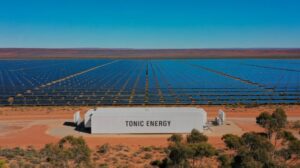Dominion Energy Virginia continues to expand battery fleet


Dominion Energy Virginia’s Dry Bridge Battery Energy Storage System, located in Chesterfield County, will store enough energy to power 5,000 homes. (Photo courtesy of Dominion Energy)
Dominion Energy has expanded its battery storage fleet further with the addition of its largest storage facility in Virginia to date.
Located in Chesterfield County, the Dry Bridge Battery Energy Storage System can store up to 20 MW of electricity. The new system, which went online in late November, adds to Dominion Energy’s growing number of battery storage facilities in the Commonwealth, including three in operation in Powhatan, New Kent, and Hanover counties and two under development in Sussex and Loudoun counties.
“Battery storage is an important part of our mission of delivering reliable, affordable and increasingly clean energy to our customers,” said Ed Baine, President of Dominion Energy Virginia. “As our battery storage fleet grows, it means we can continue adding more clean energy to the grid while delivering the reliability our customers expect.”
Earlier this year, Dominion Energy proposed more than a dozen new solar projects totaling nearly 800 MW of capacity in Virginia:
| Project | Size | Location |
| Alberta Solar | 3 MW | Brunswick County |
| Beldale Solar | 57 MW | Powhatan County |
| Blue Ridge Solar | 95 MW | Pittsylvania County |
| Bookers Mill Solar | 127 MW | Richmond County |
| Michaux Solar | 50 MW | Henry & Pittsylvania Counties |
| Peppertown Solar | 5 MW | Hanover County |
In addition to SCC approval, the utility-owned projects require local and state permits before construction may begin. If approved, construction is expected to be complete between 2024 and 2026.
GO DEEPER: Check out the Factor This! energy storage podcast playlist, including episodes on battery storage, long-duration energy storage, gravity storage, and more. Subscribe wherever you get your podcasts.
Completion of the Dry Bridge facility comes on the heels of several other major battery storage developments in recent months. In August, the company broke ground on a 50-MW battery storage project at Dulles International Airport, which will become the largest in its fleet once in operation.
Once completed, the Dulles Solar and Storage project will be the largest renewable energy project ever developed at a U.S. airport, Dominion said. It will generate up to 100 MW of solar energy and store up to 50 MW of power, enough clean energy to power more than 37,000 Virginia homes at peak output. The project will be developed across 835 acres located in the southwest corner of Dulles International Airport, and construction is expected to be complete by late 2026.
Since September, the company has announced battery storage pilot projects at Darbytown Power Station and Virginia State University, both of which will test longer-duration alternatives to traditional lithium-ion batteries.
The Darbytown Storage Pilot Project, which the company says could significantly increase the length of time batteries can discharge electricity to the grid, will test two new technologies as potential alternatives to traditional lithium-ion batteries, both of which could offer strengthened safety features for battery storage. One of the technologies could discharge energy for multiple days. The batteries in the company’s fleet and across the U.S. have durations that, on average, are limited to four hours or less.
The pilot project, which will be located at the existing Darbytown Power Station in Henrico County, will test two alternatives to lithium-ion batteries: iron-air batteries developed by Form Energy and zinc-hybrid batteries developed by Eos Energy Enterprises. Form Energy’s iron-air technology has the potential to discharge energy for up to 100 hours, longer than the batteries available on the market today.
The project would add to Dominion Energy Virginia’s growing fleet of battery storage facilities, including three in operation in Powhatan, New Kent, and Hanover counties. The company has three additional large-scale battery storage facilities under development in Chesterfield County, Sussex County, and Dulles International Airport in Loudoun County. If approved, construction would begin by late 2024, and the project would be operational by late 2026.
Dominion Energy Virginia is also partnering with Virginia State University to develop a battery storage project that would provide backup power to the school’s multi-purpose center, which hosts athletic events, conferences, concerts, and other community events.
Dominion Energy has enlisted California-based EnerVenue to manufacture and install the 1.5 MW battery on the university’s Ettrick campus, located in southern Chesterfield County. EnerVenue’s energy storage vessels use metal-hydrogen technology that can discharge energy for up to 10 hours. The technology is a variation of what’s used in the aerospace industry.
EnerVenue’s batteries utilize nickel-hydrogen chemistry, Dominion said, just as NASA has done for more than 50 years for long-duration battery storage. The batteries have the ability to showcase a high safety profile, with no thermal runaway or fire propagation risk being displayed during an open-flame test, Dominion said. As a result, the utility said there could be a reduced need for expansive safety and mitigation equipment.
In a testimony given to the State Corporation Commission of Virginia, Dominion said it had tested nine different non-lithium ion BESS technologies, a process that included safety qualifications, estimated costs, physical footprint for space requirements, technology chemistry, self-discharge rates and cycle rates.
In 2022, Dominion Virginia’s Scott Solar facility in Powhatan County became Virginia’s first utility-scale battery storage project to come online.
Originally published in Power Engineering.




